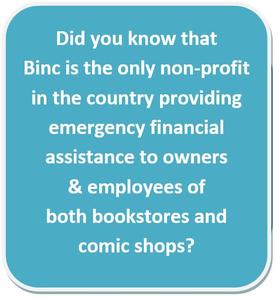First, on behalf of the book and comic industries, we must thank the Book Industry Charitable (Binc) Foundation for all it has done to help stores and store staff in need, especially since March 2020.
|
|||
|
|||
|
|||
In its 25-year history, the Book Industry Charitable (Binc) Foundation had never encountered a year as challenging as the last one. Lockdowns shut bookstores and comic stores to the public for much of the year--and some are only just reopening. Despite efforts to sell online and curbside, many stores had precipitous drops in sales and staff were furloughed or had their hours cut back. Suddenly many people didn't know how to pay the rent, mortgage or utilities, how to buy food, and how to deal with myriad other expenses. For much of its existence, Binc had focused on helping individuals, primarily booksellers and comic shop staff, who had hardships and emergencies involving health and housing and more. But last year's dire situation called for much more help than ever. In response, the foundation did extraordinary, heroic work, above and beyond its usual amazing efforts. Without Binc, it's hard to imagine where the business would be today.
Consider the numbers. With unprecedented support from people and companies in the book and comic book world, from volunteers, from its own dedicated staff and board, Binc rallied and donated nearly $3 million to stores and individuals in response to the pandemic. Binc gave disaster assistance of more than $1.2 million to 976 bookstores; $987,000 to 643 comic shops; and $734,000 to more than 500 individuals. In all, the amount of grants in just the first eight weeks of the pandemic matched the total of grants given the previous eight years.
More than 100 events raised some $1.4 million. Individuals and authors accounted for 49% of all gifts. The comic community accounted for 30% of total revenue. And, strikingly, 88% of pandemic-related gifts were from donors new to Binc. (For much more on the many fundraising events and campaigns, see articles below.)
"The work of the previous 24 years had us well positioned and prepared to respond to 2020," says Pamela French, executive director of Binc. "It didn't happen overnight. A lot of people came together."
Kathy Bartson, development director at Binc, adds, "We didn't realize how many friends we really had. The work of building relationships over the years and earning our credibility was so important, and with everyone coming together and with the outpouring of support, we could do extraordinary work at a time when it was most needed."

With the help of three volunteers, Binc created an online application to further ease the process. Other volunteers pitched in as well, and Binc essentially brought on anyone who had the skills French and her team knew they needed. They also relied on a public health emergency policy that Binc had formulated in the past. As a result of all this, Binc was able to send out the first checks to individual applicants on March 17. At this time, Binc was receiving a new request for assistance every 15 minutes, all day every day.
"It's humbling to know that what we have been working towards for the past eight years, all of the advocacy we did and conversations we had, it paid off," French says. "Folks found us when the need was highest."
(For a full account of how Binc responded in the first few months to the pandemic, see this Shelf Awareness article from May 2020.)




